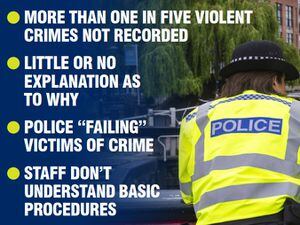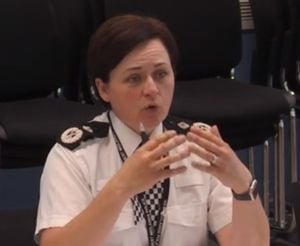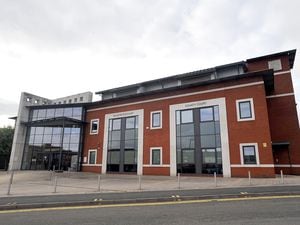Revealed: Victims 'let down' as West Midlands Police fails to log violent crime
West Midlands Police fail to record one in five violent crimes, a new report has revealed.

The force has received an ‘inadequate’ grade for how it records crime in a report from HM Inspectorate of Constabulary.
Inspectors said there had been “little evidence” of improvements since its last inspection in 2017, citing poor training, supervision and auditing arrangements.
The report, out today, said that WMP failed to record 21.8 per cent of violent crimes and 10.8 per cent of sexual offences between March and May 2018.
Overall more than 16,600 violent crimes were not logged.

Staff were said to be unaware as to why crimes had not been recorded, with many of them failing to understand basic crime recording rules and procedures.
When the force does record crime, the report said, delays had resulted in vulnerable victims not being referred to support services as soon as possible.
Reported but not recorded
HM Inspector Wendy Williams said: “I found little evidence of tangible improvements when we revisited West Midlands Police.
"Unfortunately, we have a situation in the West Midlands where many violent crimes, including those related to domestic abuse, aren’t being recorded after they’ve been reported.
“We couldn’t find any clear evidence or explanation as to why. This is particularly concerning as it shows us that staff don’t yet understand basic crime recording rules and procedures.”
An unrecorded crime is classed as one that is reported to the police but not recorded.
The force has vowed to improve, saying a revised plan would get its crime-recording arrangements back on track.
Overall WMP was graded ‘inadequate’ for recording crime, and ‘requires improvement’ for its systems and processes, and leadership and culture.
Victims 'let down'
A terrified repeat victim of domestic abuse called the police to tell them her violent ex-partner was kicking the door of her home and threatening to attack her.
But officers who attended the incident failed to record any offence and no investigation took place.
The woman’s plight was highlighted in the inspectorate's report.
Another case in the report cites a woman suffering with mental health problems, who was reported to have been pressured into having sex with a relative.

According to the report: “No safeguarding measures were put in place for the victim, no crime was recorded, and no investigation was undertaken.”
Just four out of 15 crimes involving vulnerable victims were recorded, with unrecorded crimes against children including offences of sexual assault and GBH.
Staff were said to have failed to understand basic crime recording rules and procedures, and when the force does record crime, delays had resulted in vulnerable victims not being referred to support services on time.
The report says inspectors also found several examples of attending officers “letting down” victims by simply not believing them.
The report refers to the period between March 1 and the end of May last year.
West Midlands Police responds
Deputy Chief Constable Louisa Rolfe said it was “frustrating” that the force’s grading had remained ‘inadequate’ “despite substantial progress” since 2017.
She said the report only focused on two areas of crime – violent crime and sexual offences – and as a result did not recognise overall crime, which she said WMP had “good, reliable accuracy”.
The report focused on an old recording system which the force is replacing, she said, adding: “We are confident that our current position is much improved.
“We were particularly disappointed to hear that inspectors assessed a decision to not invest additional resources in crime recording teams as a failure to improve.
“HMICFRS consistently assess our efficiency in the use of resources as good or outstanding, i.e. we are making best use of what we’ve got, yet they also identify that we do not have enough call handlers, response officers, investigators or public protection specialists to deal with our demand.
“In these circumstances I would question where these additional crime administrators might be found.”

Inspectors said they were confident that WMP had plans in place which should lead to “sustainable improvements”.
DCC Rolfe said the force would address safeguarding issues as “matters as a priority”, with a new Initial Investigation Team formed to examine case histories.
“We are always looking for ways we can get better and have a robust improvement plan in place,” she added.
“The integrity of police crime recording is vital for both public reassurance and the sound management and deployment of police resources. We are focused on the victims of crime and getting the best outcomes for them.”
PCC: Plan is in place
West Midlands Police and Crime Commissioner, David Jamieson, said: “It is important that victims get the support they need.
"That’s why I have protected victims’ funding and founded the country’s first victims’ commission to make sure resources are prioritised to the areas that need it most.
“We are also investing in technology and the force have a plan in place to address this. I support the work West Midlands Police has undertaken on addressing crime data integrity.
“Of course this comes at a time of unprecedented demand and falling government funding. Myself and West Midlands Police are committed to responding to and preventing violence.”
Overall WMP was graded ‘inadequate’ for recording crime, and ‘requires improvement’ for its systems and processes, and leadership and culture.
Four out of the seven forces inspected in England and Wales in June 2017 were rated ‘inadequate’. One of them Kent Police, received an ‘outstanding’ rating in its re-inspection.





